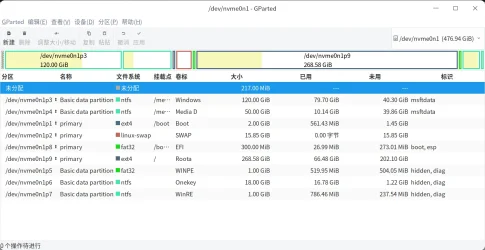I just wanted to make a couple of corrections because I noticed some incorrect terminology used a few times that could lead to confusion:
There is more than one partition some are referring to as a "reserved" partition so it's important to differentiate between them.
The System Reserved partition is typically about 500 MB in size with Win 10+. The size can vary a bit, that's a typical value. Note that only an MBR disk has a System Reserved partition. On a GPT disk, this partition is known as the Recovery Partition which holds the Recovery Environment (Windows RE).
The MSR or
The EFI partition on a GPT disk is 100 MB except in the case of an Advanced Format 4K drive because the minimum FAT32 partition size on this type of disk is 260 MB. For use with scripts or unattended installs I always specify a size of 260 MB to guarantee that it will work on any disk.
With all that said, the real question in my mind is this: On a system with so much available free space in the primary partition, why would a 16 MB partition (one sixty-fourth of a GB) even concern you? I would be far more inclined to leave it alone unless I was somehow desperate for space, but that's just my opinion
There is more than one partition some are referring to as a "reserved" partition so it's important to differentiate between them.
The System Reserved partition is typically about 500 MB in size with Win 10+. The size can vary a bit, that's a typical value. Note that only an MBR disk has a System Reserved partition. On a GPT disk, this partition is known as the Recovery Partition which holds the Recovery Environment (Windows RE).
The MSR or
MicroSoft Reserved partition is the 16 MB partition on a GPT OS drive and is unformatted. On non-OS GPT disks, the MSR is 128 MB for disks larger than 16 GB, 32 MB for disks smaller than 16 GB. You can typically delete this partition, it's considered "Reserved for Future Use", so if you prefer upgrades installs rather than clean installs, there is a possibility that you may one day find Microsoft using this partition, but who knows what they will do The EFI partition on a GPT disk is 100 MB except in the case of an Advanced Format 4K drive because the minimum FAT32 partition size on this type of disk is 260 MB. For use with scripts or unattended installs I always specify a size of 260 MB to guarantee that it will work on any disk.
With all that said, the real question in my mind is this: On a system with so much available free space in the primary partition, why would a 16 MB partition (one sixty-fourth of a GB) even concern you? I would be far more inclined to leave it alone unless I was somehow desperate for space, but that's just my opinion
My Computers
System One System Two
-
- OS
- Win11 Pro 24H2
- Computer type
- PC/Desktop
- Manufacturer/Model
- Self-built
- CPU
- Intel i7 11700K
- Motherboard
- ASUS Prime Z590-A MB
- Memory
- 64GB (Waiting for warranty replacement of another 64GB for 128GB total)
- Graphics Card(s)
- No GPU - Built-in Intel Graphics
- Sound Card
- Integrated
- Monitor(s) Displays
- HP Envy 32
- Screen Resolution
- 2560 x 1440
- Hard Drives
- 1 x 1TB NVMe SSD
1 x 2TB NVMe SSD
1 x 4TB NVMe SSD
3 x 512GB 2.5" SSD
1 x 4TB 2.5" SSD
5 x 8TB Seagate Barracuda HDD
- PSU
- Corsair HX850i
- Case
- Corsair iCUE RGB 5000X mid tower case
- Cooling
- Noctua NF-S12A chromax.black.swap case fans (Qty. 7) & Home Computer Specifications, Configuration, and Usage Notes General Specifications ASUS Prime Z590-A motherboard, serial number M1M0KC222467ARP Intel Core i7-11700K CPU (11th Gen Rocket Lake / LGA 1200 Socket) 128GB Crucial Ballistix RGB DDR4 3200 MHz DRAM (4 x 32GB) Corsair iCUE RGB 5000X mid tower case Noctua NH-D15 chromax.black CPU cooler Noctua NF-S12A chromax.black.swap case fans (Qty. 7) & Corsair LL-120 RGB Fans (Qty. 3)
- Keyboard
- Corsair K70 Max RGB Magnetic Keyboard
- Mouse
- Logitech MX Master 3
- Internet Speed
- 1Gb Up / 1 Gb Down
- Browser
- Edge
- Antivirus
- Windows Defender
- Other Info
- The five 8TB drives and three 512GB SSDs are part of a DrivePool using StableBit DrivePool software. The three SSDs are devoted purely to caching for the 8TB drives. All of the important data is stored in triplicate so that I can withstand simultaneous failure of 2 disks.
Networking: 2.5Gbps Ethernet and WiFi 6e
-
- Operating System
- Win11 Pro 23H2
- Computer type
- Laptop
- Manufacturer/Model
- Lenovo ThinkBook 13x Gen 2
- CPU
- Intel i7-1255U
- Memory
- 16 GB
- Graphics card(s)
- Intel Iris Xe Graphics
- Sound Card
- Realtek® ALC3306-CG codec
- Monitor(s) Displays
- 13.3-inch IPS Display
- Screen Resolution
- WQXGA (2560 x 1600)
- Hard Drives
- 2 TB 4 x 4 NVMe SSD
- PSU
- USB-C / Thunderbolt 4 Power / Charging
- Mouse
- Buttonless Glass Precision Touchpad
- Keyboard
- Backlit, spill resistant keyboard
- Internet Speed
- 1Gb Up / 1Gb Down
- Browser
- Edge
- Antivirus
- Windows Defender
- Other Info
- WiFi 6e / Bluetooth 5.1 / Facial Recognition / Fingerprint Sensor / ToF (Time of Flight) Human Presence Sensor






